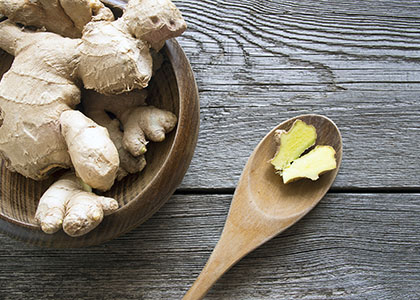
How Ginger Helps Your Gut (+ 11 More Ways it’s Good for You)
By Claire Georgiou, Reboot Naturopath, B.HSc ND
News flash! There’s a big reason why so many of our juices contain ginger. Ginger (the rhizome of zingiber officinale) is a long used and loved spice that has been consumed as a food and as a medicinal spice for good health and health ailments for centuries. Ginger has a long list of wonderful health benefits that range from a stomach calmative to a broad spectrum anti-inflammatory. Many cultures and people around the world consume ginger daily whether it’s in many of their meals to munching on pickled or crystallized ginger to grating it and steeping it in hot water and drinking it regularly as a tea blend such as chai tea.
The benefits of ginger listed in many herbal texts are anti-nausea, anti-inflammatory, analgesic, carminative, antiplatelet, demulcent, diaphoretic (supports the fever process to support WBC activity and aids the immune system), peripheral circulatory stimulant, expectorant (supports excess mucus removal ie chest infections) and metabolic stimulant. Let’s break those down for you.
Ginger’s array of health benefits include:
- Digestive Aid
Helps to reduce bloating, flatulence, intestinal colic, IBS and poor digestion as it stimulates digestive acids and secretions thus supporting the digestion of food and nutrient absorption and assimilation. - Anti-Nausea
Reduces nausea and vomiting of any kind including travel or motion sickness, morning sickness and post-operative nausea. - Blood Glucose Support
One small study saw ginger reduced fasting blood sugar in diabetics along with a reduction in HbAc1. - Reduces Arthritic Inflammation and Pain
Ginger helps to improve rheumatoid arthritis, osteoarthritis, or any type of rheumatism including muscle pain and exercise induced muscle soreness due to its anti-inflammatory properties. - Cold Hands & Feet and Poor Circulation
Due to its warming and circulatory stimulating properties it can help cold hands and feet due to improved blood circulation to the extremities and it may help in Raynaud’s disease. - Painful Periods
No more cramping! Ginger can help to reduce painful spasmodic dysmenorrhea and can also be subscribed for endometriosis due to the anti-inflammatory and analgesic benefits. - Upper Respiratory Infections
Ginger is excellent for supporting the immune system against the common cold and other viral infections. Reduces nasal congestion, coughs and sore throats. - Lung Disease and Infections
Bronchitis, asthma and bronchial asthma may be supported with the consumption of ginger. These compounds help to support immunity, remove excess mucus and reduces inflammation of the airways. - Migraines
If your head is aching, it can be helpful in reducing headaches and migraines due to its anti-inflammatory benefits. Ginger may also help to protect the memory and support brain function and may reduce brain damage as shown in animal studies. - Anti-Cancer Properties
Gingerols and other compounds have shown to be protective against colorectal, prostate and liver cancer. - Gut Infections
There are some animal studies that demonstrate ginger may inhibit H.pylori stomach infections and therefore reduce gastrointestinal cancers such as stomach and gastric ulcers. It also shows promise in the reduction of periodontal bacteria. - Multi-drug Resistance Pathogens
Garlic and ginger combined may possess effective anti-bacterial activity against multi-drug clinical pathogens and can be used for prevention of drug resistant microbial diseases.
This special spice has been used in dishes all around the world, from curries to stews, cookies, sweets, juices and other delicious drinks.
Therapeutic dosages of ginger are approximately 1g per day and in pregnancy 500mg to 1g. It is cautioned not to exceed 4g per day on a regular basis. Ginger can be taken in food regularly, as a tea, powdered in capsules and tablets and as an herbal tincture.
Here are some great Reboot ginger recipes to enjoy:
- Classic Carrot Apple Ginger Juice
- Low Sugar Lemon-Ginger Green Juice
- A Palate-Pleasing Pear Lemon Ginger Juice
- Green Ale Juice
- Carrot and Ginger soup
- Cardio Carrot Ginger Dressing Recipe by Andrea Beaman
- Spiced Golden Milk with Turmeric
- Brazil Nut Chai Tea Latte
- Frothy Hot Lemon Water with Ginger
Caution may be needed when taking high doses: in peptic ulceration, gallstones, excess consumption in pregnancy (>2g daily in supplements), warfarin and other blood thinning medications. Seek professional advice.